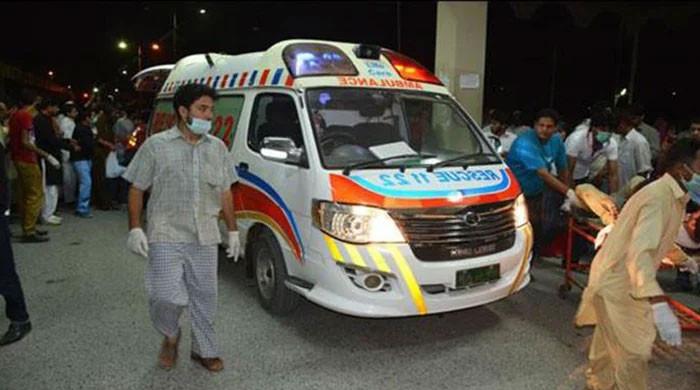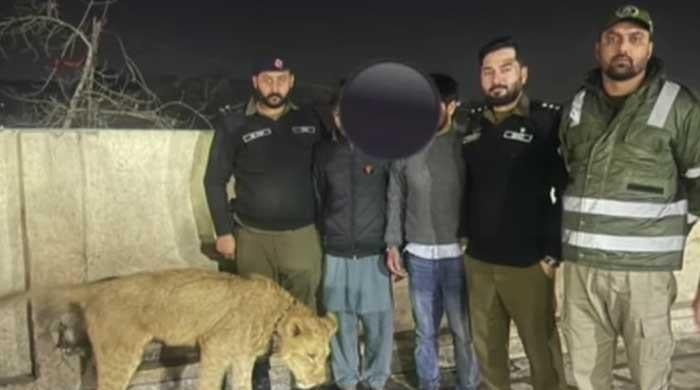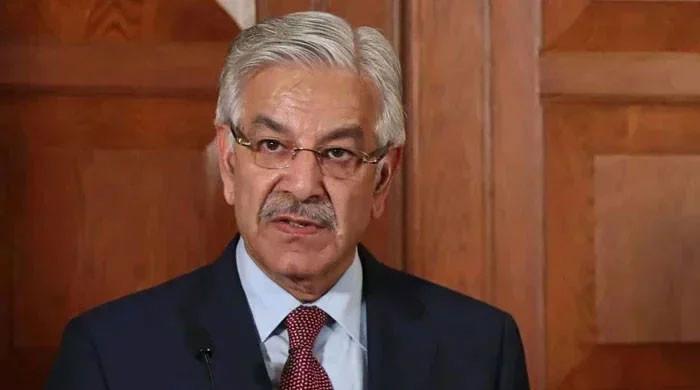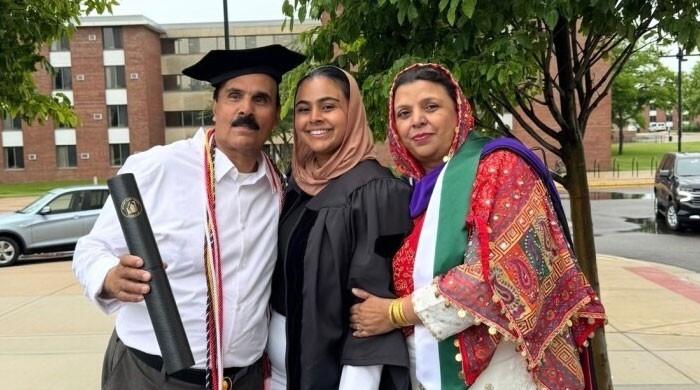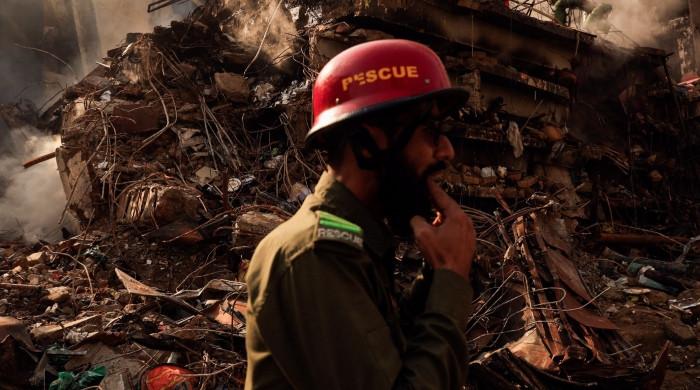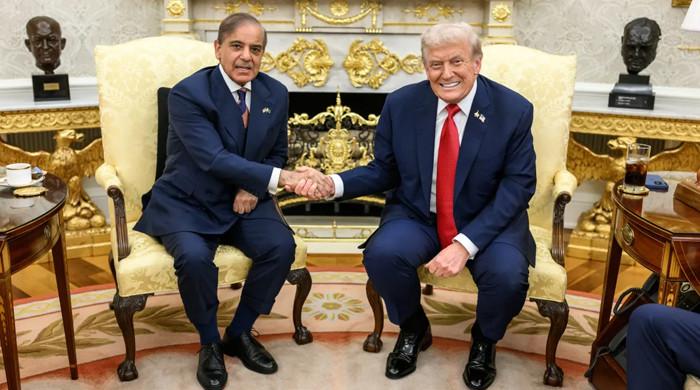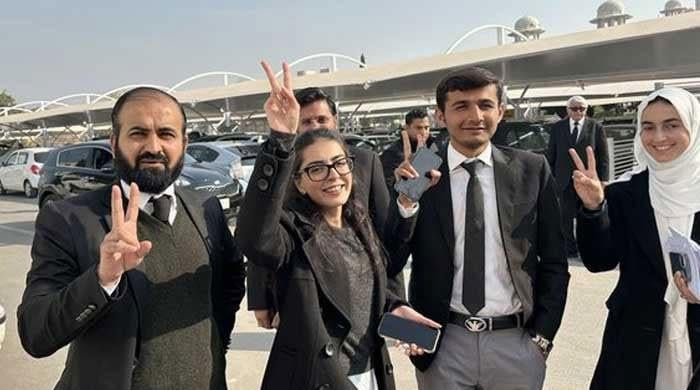The Hafiz Saeed I know
It is true that Hafiz Saeed will remain a jihadi till the very end, but it is also true that he has transformed himself considerably over the years
February 17, 2020
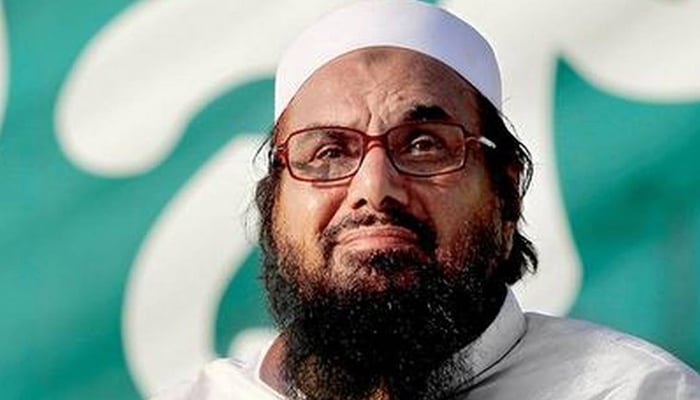
It was sometime in the late 90s that a bearded man came to my office and introduced himself as Yahya Mujahid, spokesman of the Jamaat ud Dawa (JuD).
He requested me to interview his leader, Hafiz Muhammad Saeed.
A few days later, I visited their madrassa in Gulshan-e-Iqbal, Karachi and was greeted warmly by Mujahid and a group of 'jihadi' students.
Mujahid took me around the madrassa and introduced me to other clerics as well. They had been busy preparing for Hafiz sahab's 'grand meeting' later in the day.
As I entered a large room, I saw a bearded man wearing white shalwar kameez. As he saw me enter with Mujahid, he stood and embraced me with a salaam. It was Hafiz Saeed himself.
I had been accompanied by my photographer, but — to my utter surprise — I was told by Yahya that Saeed did not want to be photographed. I realized then that he was among those religious traditionalists who considered the composition of human pictures as 'un-Islamic.'
Not only was Saeed also against Western democracy, he was even critical of religious parties like the Jamaat-e-Islami (JI) and the Jamiat Ulema-e-Islam (JUI) — both of whom have, from the pre-Partition era, believed in change through the ballot.
In that meeting, Saeed described to me in detail his 'jihadi' narrative, which I found was confined to the 'Jihad-e-Kashmir' (he did not discuss much about the 'Jihad-e-Afghanistan').
I also found him to be against sectarian groups, as he believed they had divided the 'forces of Islam'.
During the interview, some of his students and elders came to listen to him, and also to my tough questions.
"I do not believe in suicide bombing and I am also against killing innocent people. It is against the teachings of Islam," he told me. But, in the same breath, he added that he did believe in fidayeen attacks — a type of guerrilla warfare where the attacker or attackers proceed on a mission knowing well that they may not survive.
After the interview, he handed me some jihadi literature, the JuD's newspaper and magazine (the latter of which they sent to me regularly till two years ago, when their activities were officially restricted and the publications were banned).
I had asked then about the circulation of their newspapers and magazine, and was not surprised when Yahya told me it was in the thousands. The JuD's social network is considered among the strongest and biggest in the country.
Changing times, changed men
Years later, I noticed a transformation in Hafiz Saeed.
Unlike in my first meeting with him, he did not object to the presence of TV cameras and photographers.
I asked him the reason behind this change.
With his typical smile, he replied, "Bhai, media bari taaqat rakhta ha. Hum ko apna paigam agay lay jana ha tu tabdeli tu lani paray ge." (The media is very powerful. If we wish to get our message across, we will need to bring about some changes.)
There were similar changes in some other hard-line Islamic clerics as well, including the late Mufti Nizamuddin Shamzai, who had been a 'fatherly figure' to the likes of Osama bin Laden and Mullah Mohammad Umer. The latter had even been Shamzai's student in his early years.
I witnessed a similar shift in attitudes towards the democratic process.
As pressure started mounting on the Pakistani establishment from the US and other world powers, retired Gen Pervez Musharraf banned all jihadi outfits in January 2002 — three months after the US-led coalition attacked Afghanistan in a bid to capture or kill top al-Qaida leaders, including bin Laden.
The administration seized all publications of proscribed groups, removed their 'charity boxes' from roadside hotels, mosques and madrassas. Their bank accounts were also frozen.
This was the first major crackdown on 'jihadi outfits.'
The writing was on the wall, and jihadi groups realized that things in the coming years would not be as amenable to their objectives and modus operandi as they were in the 80s.
The jihadi narrative that had been anti-democracy thus started changing.
Till 2013, the JuD had been against taking part in elections, but they softened their view sometime before the 2013 elections.
For example, in the 2008 elections, Hafiz Saeed forbade his supporters from casting their votes — forget supporting a party or actually taking part in elections themselves.
In 2013, however, he did not stop his supporters from participating in the process; he instead asked them to lend their support to other religious parties that were contesting. Still, he remained reluctant about getting his party registered with the Election Commission.
Though the JuD did not manage to get registered for the 2018 elections (even though it tried), its supporters and some of its activists were eventually allowed to contest either as independents or from the platform of an alliance of like-minded parties.
However, like in all previous elections, religious parties once again failed to make any impact on the electorate and did not manage more than a handful of seats.
Set up by dissidents
Over my journalistic career, I have always maintained my contacts within all groups, including jihadi outfits. This really helped me when I joined the international wire service Agence France Presse (AFP) shortly before 9/11.
When 9/11 occurred, I had been sitting in my office, watching the unbelievable happen on TV.
About half an hour after the fall of New York's World Trade Center, I got a fax on the letterhead of a proscribed organisation, Lashkhar-e-Tayiba (LeT), claiming that the attack was carried out by its commandos.
As a journalist, it looked like a major scoop for me. But, also as a journalist, I was obliged to get it double-checked.
I told my chief in Islamabad about the fax, and told him I was not sure if it was genuine or not. I also informed Rana Jawad, who is presently Geo's director news, but was in AFP, Islamabad at the time.
I tried to contact Yahya Mujahid and Hafiz Saeed to verify the story, but their phones were switched off.
My chief than called me and asked me to send the story to him, which I did. I told him to wait till it was either confirmed or denied.
He ignored the advice and sent the story from the Islamabad dateline. Within seconds, it became the top story around the world, with everyone quoting AFP.
Minutes later, I got a call from Yahya. Then Saeed himself called. Both denied and questioned the authenticity of the letter. I, too, was not happy with the Islamabad office and the way they had released the story without verification.
AFP was left with no other choice but to clarify the story with Yahya's quotes.
Later, Yahya told me that the fax had been sent by some of the dissidents within their ranks, who had been sacked by the party a few months back.
But the 'damage' had already been done.
In the bad books
Even with their transformation and joining of mainstream electoral politics, the JuD and Hafiz Saeed could not change the world's opinion about themselves.
From the UN to the US, the perception is that he leads a terror network.
Last Wednesday, an Anti-Terrorism Court handed down a heavy sentence to Hafiz Saeed and another leader, Malik Zafar Iqbal, in a case concerning terror financing and membership of a proscribed organisation.
While it is true that Hafiz Saeed will remain a 'jihadi' till the end, it is also true that in the last few years, he has tried to transform himself enough to join mainstream politics.
That is why, even with the paradigm shift in the state's policy from that of the 80s and 90s to the modern day, his trial, arrest and conviction look more to do with the FATF's scrutiny of Pakistan's financial doings rather than a serious prosecution of who he is and what he has been up to.
The writer is a senior columnist and analyst at Geo, The News and Jang.
Twitter: @MazharAbbasGEO




